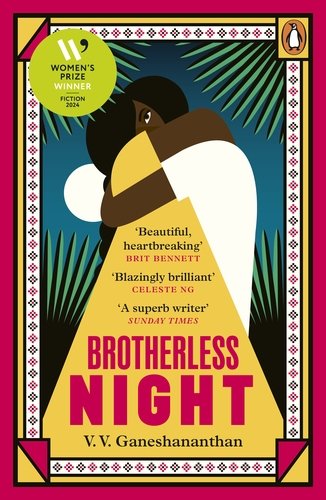Brotherless Night
“You must understand: There is no single day on which a war begins. The conflict will collect around you gradually, the way carrion birds assemble around the vulnerable, until there are so many predators that the object of their hunger is not even visible.”
Title: Brotherless Night
Author: V. V. Ganeshananthan
Published: 25/04/2024
Sixteen-year-old Sashi wants to become a doctor. But over the next decade, as a vicious civil war tears through her hometown of Jaffna, her dream takes her on a different path as she sees those around her, including her four beloved brothers and their friend, get swept up in violent political ideologies and their consequences. Desperate to act, she must ask herself: is it possible for anyone to move through life without doing harm?
Discussion Questions
The novel begins with a moment of healing — K using a folk remedy on Sashi’s burn. How does this scene foreshadow the role of medicine and caregiving in the story? How does Sashi’s pursuit of medicine intersect with the war and her moral dilemmas?
Sashi struggles with conflicting loyalties to her family, her community, K, and even the idea of neutrality. How does the novel explore the ways in which war demands choices that may betray one’s personal values?
Early on, Sashi reflects, “I didn’t know if the whole of any violent story could be told.” Do you think Brotherless Night succeeds in telling a “whole” story of the Sri Lankan civil war? Can any novel truly capture the full reality of war?
Ganeshananthan has spoken about fiction’s ability to tell historical truths. In what ways does Brotherless Night feel like a history lesson? In what ways does it feel like a deeply personal, intimate narrative?
The novel highlights how war is often fought on women’s bodies, and Sashi, as a female protagonist, navigates a male-dominated conflict. How does her experience differ from the men around her? What does the novel suggest about the gendered impacts of war?
Many characters such as Sashi’s brothers, K, and even Sashi herself choose when to speak and when to remain silent. What role does silence play in the novel? How does it function as both a form of resistance and complicity?
The novel presents a world where truth is manipulated, information is controlled, and people must carefully navigate what they say. How does this atmosphere of censorship shape Sashi’s decisions? What parallels can you draw to modern-day conflicts?
As Sashi works as a medic for the Tamil Tigers, she is forced to confront her own complicity in the war. At what point does survival turn into participation? How does the novel challenge black-and-white notions of innocence and guilt?
Ganeshananthan, as a Sri Lankan-American writer, is writing about a war she did not personally experience. How does her outsider perspective affect the novel? Do you think distance allows for clearer storytelling, or does it present limitations?
The novel is described as having the “intimacy of a memoir” and “the urgency of reportage.” How does Ganeshananthan balance historical detail with emotional depth? Did any particular scene feel especially powerful or haunting to you?
Sashi’s coming-of-age story unfolds within a brutal historical conflict. How does the novel weave personal relationships — family, friendship, love — into the larger political narrative? Can any aspect of personal life remain untouched by war?
The novel grapples with the idea of whose suffering is acknowledged and whose is erased. How does Brotherless Night challenge mainstream narratives of war? What lessons does it offer about the power of storytelling in preserving lost voices?
The novel occasionally shifts into second person, directly addressing the reader. How does this choice affect your engagement with the story? Does it make the novel feel more like a testimony?
The novel ends in 2009 with the massacre at Mullivaikkal, but its author is part of the Sri Lankan Tamil diaspora. How does Brotherless Night speak to the experiences of those who have left but still feel connected to the war? What does it say about the weight of memory for displaced communities?
Further Reading:
Women’s Prize for Fiction Brotherless Night Reading Guide: https://womensprize.com/app/uploads/2024/05/Brotherless-Night_reading_guide.pdf
‘On Authenticity, Research, and Writing From the Diaspora’, V.V. Ganeshananthan on Writing About Sri Lanka: https://lithub.com/on-authenticity-research-and-writing-from-the-diaspora/
The Asian Review, In Conversation with V.V. Ganeshanathan: https://asian-reviews.com/2024/05/03/brotherless-night-is-the-book-i-wanted-to-read-so-i-wrote-it-vv-ganeshananthan/
The Indian Express, ‘Brotherless Night' book review: Notes from a mourner’s life‘: https://www.newindianexpress.com/lifestyle/books/2024/Jul/27/brotherless-night-book-review-notes-from-a-mourners-life
Marmalade and Mustardseed Brotherless Night Book Guide: https://www.marmaladeandmustardseed.com/bookguidesblog/brotherless-night



